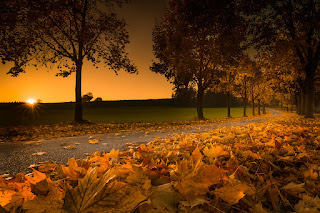Autumn days and Purcell's 'Thou knowest, Lord'
Thou knowest, Lord, the secrets of our hearts;
Shut not thy merciful ears unto our pray'rs;
But spare us, Lord most holy, O God most mighty.
O holy and most merciful Saviour,
Thou most worthy Judge eternal,
Suffer us not at our last hour,
For any pains of death to fall away from Thee.
The words, of course, are from the 1662 Burial rite, said by the priest "when they come to the grave". It is, then, a prayer rooted in and flowing from a stark recognition of our mortality, of our dependence upon "God most mighty" at the hour of our death.
Purcell's setting, however, ensures that we understand this prayer to be the prayer of faith, not of desperate, uncertain pleading. There is nothing harsh or incessant about the setting. It embodies the quiet, reserved but abiding hope of the Prayer Book Burial rite.
Hearing it sung in late-October brought to mind the late Queen's funeral in mid-September, on the cusp of Autumn. Purcell's anthem had then been sung by the choirs of Westminster Abbey and the Chapel Royal, at the beginning of the state funeral, a powerful expression of the Christian hope in which the late Queen lived and died.
When I heard it sung in the parish church, the rich glory of early Autumn days had gone. Harvest Thanksgiving was past. By late-October the leaves were beginning to fall, the days to darken. Autumn's yearly intimations of our mortality were again becoming evident. The anthem transfigured these intimations, bathing the falling leaves, the darkening days, and the fall of the year in the light of the life everlasting.
In doing so it also suggested the approach of November, the month when the memory of the departed is recollected by the Church. On All Saints' Day we celebrate the hope that underpins Purcell's anthem, the prayer answered in "the spirits of just men made perfect": "that we may come to those unspeakable joys, which thou hast prepared for them that unfeignedly love thee". We behold in "thy blessed Saints" that the God of glory does not "Shut not thy merciful ears unto our pray'rs".
The joy of All Hallows, however, passes, with the sombre, stark days of Remembrancetide falling in mid-November. The days are then much colder, the trees bare. Autumn is nearing its close as we remember those who fell in the trenches of Flanders, in the cold waters of the Atlantic, on the beaches of Normandy, in the jungles of Asia and the Pacific; in the lanes and byways of Northern Ireland. Those whose "name liveth for evermore". Purcell's anthem will come to mind on Remembrance Sunday, gathering up in prayerful commendation the multitude of the fallen, beseeching Almighty God that "the pains of death" will not have taken these souls without number from eternal mercy.
After Remembrancetide, November turns towards Advent, and Autumn reaches it close: late afternoon sunsets, frosts, and preparations for the festive season. And then, too, the echoes of Purcell's anthem from late October will still be heard, as we prepare to stand before the One who "shall come again in his glorious Majesty, to judge both the quick and the dead".
Thou knowest, Lord, the secrets of our hearts;
Shut not thy merciful ears unto our pray'rs;
But spare us, Lord most holy, O God most mighty.
O holy and most merciful Saviour,
Thou most worthy Judge eternal,
Suffer us not at our last hour,
For any pains of death to fall away from Thee.




Comments
Post a Comment